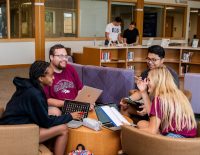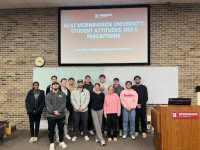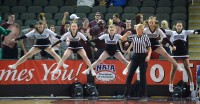 by Claire DeRoin— In this day and age where celebrities’ children have unique names –Apple Martin, Suri Cruise, Maddox Jolie-Pitt – Americans are unleashing their inner creativity when naming their children. Having a unique name is almost a guarantee to be remembered among a sea of Brittneys, Ashleys, Justins, and Daniels. Some Morningside students are among the lucky few with out of the ordinary names.
by Claire DeRoin— In this day and age where celebrities’ children have unique names –Apple Martin, Suri Cruise, Maddox Jolie-Pitt – Americans are unleashing their inner creativity when naming their children. Having a unique name is almost a guarantee to be remembered among a sea of Brittneys, Ashleys, Justins, and Daniels. Some Morningside students are among the lucky few with out of the ordinary names.
Calina Conner, sophomore biopsychology major, has never met anyone with the same first name as her.
“My mom really liked the name Sabina, but my dad hated it,” Conner explained. “They knew my middle name was going to be Lynne, so they wanted something that sounded good with that. My dad thought of the name Calina.”
Conner embraces the uniqueness of her name. She likes that it makes her stand out, and hasn’t gotten rude comments about it. Sometimes, people do mispronounce, however. “If they mess up, I just politely correct them,” she said.
Sophomore biology major Larkin Bennett hasn’t had much trouble with people mispronouncing his name. He enjoys the benefit of never being confused for another Larkin. “I like that when someone calls out my name, they are always addressing me, not another person in the crowd.” The origins of his name are less inventive than Calina’s, but creative nonetheless. Bennett said his dad’s friend had the same name, “and it was my great grandmother’s maiden name, as well.”
Another trend hitting the mainstream is using the opposite gender’s name – at least for girls.
Sophomore Tyler Arensdorf enjoys having a name fairly rare for girls. She has only met two other girls with her first name. “I am named after an actress my mom saw in a movie while she was pregnant with me,” Arensdorf explained.
“A lot of younger kids will tell me my name is a boys’ name, but most people really like the idea of Tyler as a girls’ name,” Arensdorf said. She doesn’t seem too bothered by the attention her name occasionally gets, and sometimes doesn’t even make the correction when people mispronounce it. “A lot of people will call me Taylor, so I will either just go with it or tell them that it is Tyler.”
Morningside’s career counselor, Stacie Hays, sees unique names as a double-edged sword.
“It’s really going to depend on who the employer is,” she said. “A unique name could potentially be a good thing or a negative thing. It depends on the first impression the employer gets from it.”
Hays said the advantage to having an out of the ordinary name would be for an employer to remember that individual more vividly due to the name in a sea of other applicants and job candidates.
However, names can be an applicant’s downfall, too. “Sometimes, if you have a name that’s hard to pronounce, an employer might feel intimidated about calling and pronouncing a name incorrectly,” Hays said.
Calina Conner agreed with Hays’ sentiment. “I definitely think employers are intrigued by my name, but something I think they’re nervous to say it, in case they pronounce it wrong,” Conner said.
Hays suggested using a resume to simplify complicated or hard to pronounce names.
“What I love about resumes is that it’s really your own document. If students want, they can put their nickname or spell their name in a phonetic way. Your application has to have your full legal name, but your resume can have your full legal name and nickname in quotations.”
If a student chooses their full name over their lifelong nickname, such as Elizabeth over Liz, they should consider whether they will be able to consciously remember that they are changing professional names.
In the end, Hays said, it all comes down to personal preference. “You need to go with what you’re comfortable with, but looking forward, consider how you want to be seen in a professional light.”
It’s unlikely that an employer would turn down the perfect candidate for a job due to their name. After all, as Shakespeare wrote, “A rose by any other name would smell as sweet.”





Leave a Reply